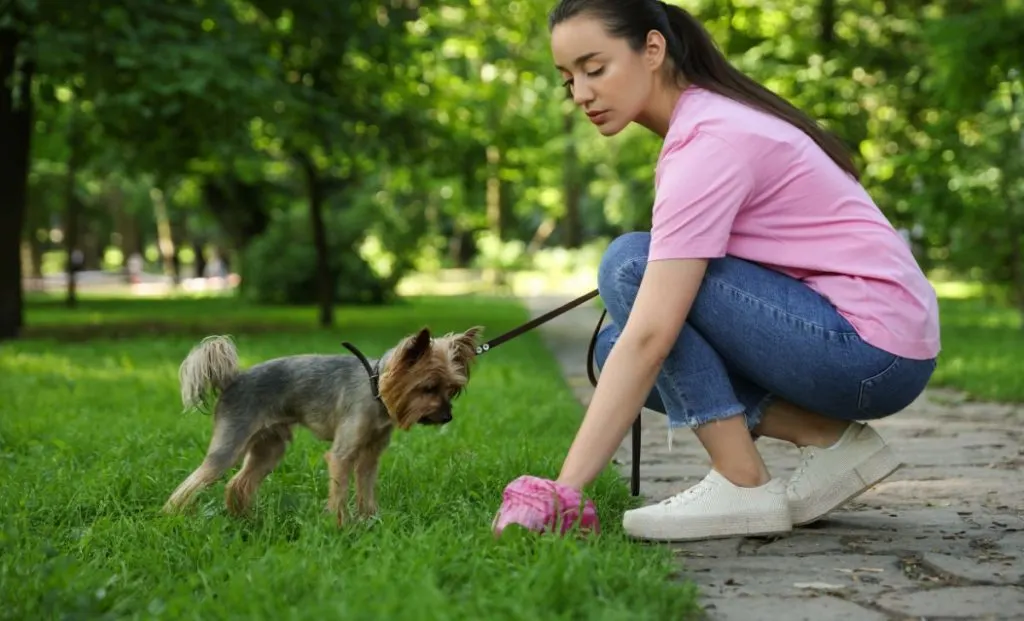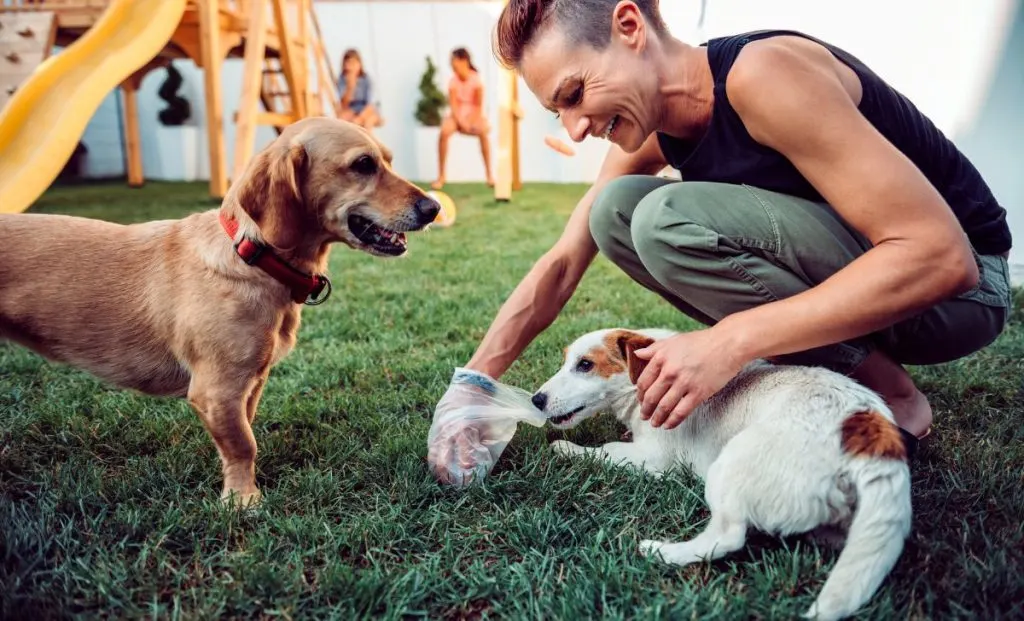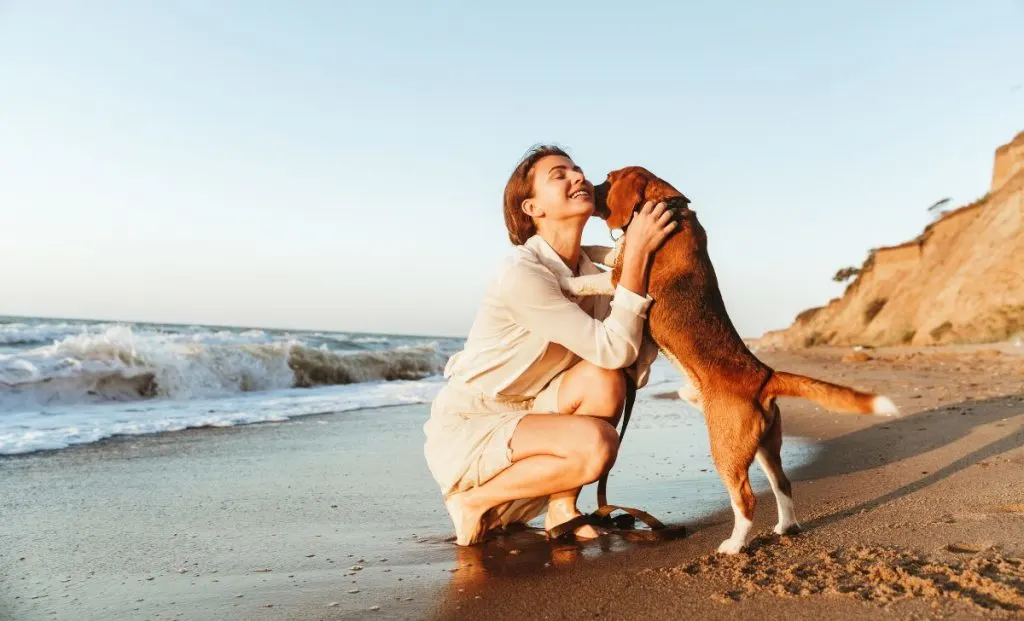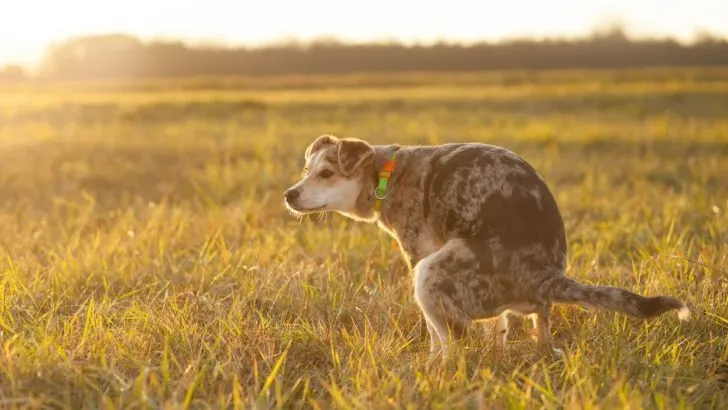Ever wondered why dogs eat their own poop? Perhaps you found your canine companion turning snack time into a “crappy” experience. That’s rather odd…Or is it?
Indeed, it may seem gross and baffling to us, but this is a relatively common phenomenon among dogs.
As a fellow pet parent, stumbling upon your dog in the act might leave you wondering or turning your nose up in disgust.
Well, there’s more to this habit than meets the eye (or the nose!).
Let’s delve into the reasons behind this curious behavior!
Is It Normal For A Dog To Eat His Own Poop?
Yup, it’s gross but not unusual. Dogs are curious creatures, and sometimes that curiosity has a yucky side!
Canine coprophagia is the scientific term that we are looking for here.
This can be a leftover trait from their wild ancestors, who might have eaten feces to keep their living areas clean or to reclaim some undigested nutrients.
Sometimes, it’s simply a sign that a dog is bored or seeking attention.
Let’s take a look at some possible causes to this odd (and yucky) doggie phenomenon.
Behavioral Causes Of Coprophagia In Dogs

Dogs are known for their silly antics and endearing habits such as putting their paws on us, cuddling under the sheets, and simply staring at us with their puppy eyes.
However, this is a habit that may not be as endearing as the above mentioned behavior.
While it might make us wrinkle our noses in disgust, coprophagia, or the act of eating poop, is a more common habit among our furry friends than many pet parents might think.
There are several behavioral reasons why your dog eats his own poop, ranging from learned behavior to a simple case of “this tastes interesting.”
However, there are also some serious medical conditions that can be associated with this odd behavior.
Let’s dive into the scoop on poop and uncover why some dogs might find this habit hard to resist.
1. Learned Behavior From Mother Dogs
For puppies, the apple doesn’t fall far from the tree. Or should we say, the puppy doesn’t stray far from the poop?
This somewhat disgusting dining preference can be a leftover habit from their puppyhood.
Mother dogs often eat their puppies’ feces to keep the den clean, a behavior puppies may mimic and carry into adulthood. It’s their first lesson in cleanliness, although a bit gross from a human perspective.
Perhaps this is also the reason why female dogs are more prone to eating feces than male dogs. That’s a fun fact for you!
Being so young and new to the world, the puppies might simply acquire this new behavior and do it out of curiosity.
As they age, this behavior usually stops. But for some puppies, it keeps on going.
2. Attention Seeking
Oh, the things we do for love and attention, right? Let me tell you about my friend’s dog. Her little Frenchie eating poop must have been thinking, “If I eat this, will they notice me?” And, oh, did we notice!
You see, some dogs might turn to eating their own, or even worse, cat poop, as a way of simply saying, “Hey, look at me!”
I mean, it’s their not-so-subtle way of grabbing your attention, even if it’s for all the wrong reasons.
For these drama kings and queens, any reaction from their pet parents, even a shriek of horror, can be considered a standing ovation.
For 5 minutes of attention, they will put everything in their mouths, even poop!
3. Anxiety And Stress
Some pups may constantly be on the lookout for ways to ease their anxious minds.
For instance, there was a client who had a Cane Corso with red eyes. The poor pup was showing clear signs of stress and nervousness.
This resulted in the dog starting to eat poop, as a misguided attempt at self-soothing – much like a nervous person biting nails.
If you think that anxiety and stress might be causing all these changes in Fido’s behavior, then it might be time to visit a vet and/or a trainer.
Such pups are quite likely in need of training, behavioral changes or more puzzle toys to engage their minds.
4. They Like The Taste
Yes, as bizarre as it sounds, some dogs might think of poop as the tastiest snack.
They might think that fresh stools are the canine equivalent of a secret menu item. Yummy, isn’t it?
My friend, who has both a male and female Belgian Malinois, found that the female particularly savored these icky treats. This got me thinking that both genders might harbor a preference for this peculiar habit.
More often than not, this taste preference can be attributed to nutritional deficiencies, plain curiosity, or an inappropriate association with what constitutes a treat.
I mean, it’s definitely a delicacy we’ll never understand.
5. Environmental Influences
Living conditions and the company a dog keeps can significantly influence their likelihood to engage in coprophagia a.k.a eat poop.
Dogs living with other animals, especially cats, might develop an inappropriate association with the litter box as a snack bar.
Something else to note is that dogs are pack animals. In the wild, keeping their rest area clean is instinctual. In a modern setting, this might translate into a dog eating poop to tidy up.
Or perhaps, their living situation doesn’t meet their enrichment needs, leading them to find entertainment in… unconventional ways.
A lack of stimulation or not much time spent engaging in activities can lead dogs to explore (and taste) just about anything out of sheer boredom.
Medical Causes Of Coprophagia In Dogs

When behavioral causes are ruled out, it is time to turn to some serious causes.
Under the microscope of veterinary medicine, the peculiar dining habits of our canine companions can sometimes be traced back to health issues.
Let’s check some medical causes of coprophagia that might have your dog turning to fresh stools.
1. Enzyme Deficiencies
To put it simply, enzyme deficiencies in dogs are a bit like missing a crucial ingredient in a recipe. Without them, the whole process doesn’t quite work as it should.
These enzymes play a vital role in the digestive system, helping to break down food into absorbable nutrients.
Therefore, canine coprophagia can actually be a clinical sign of a more serious underlying condition known as exocrine pancreatic insufficiency (EPI). EPI occurs when the pancreas fails to produce sufficient amounts of digestive enzymes.
When there’s a shortfall, it means that food isn’t properly digested, leading to nutritional deficiencies since the body can’t absorb all the important nutrients it needs.
When a dog has EPI, you might notice several symptoms alongside coprophagia, such as
- weight loss
- diarrhea
- stools that appear fatty or greasy
- increased flatulence
These symptoms occur because, without the necessary digestive enzymes, food passes through the gastrointestinal tract largely undigested.
For pet parents noticing these signs, it’s crucial to seek professional help. A veterinarian can diagnose EPI with specific tests and then recommend appropriate treatments.
2. Thyroid Disease
Thyroid disease in dogs is another medical condition that might lead them down the path of coprophagia.
For instance, certain medical conditions such as diabetes, hypothyroidism, and Cushing’s disease can significantly alter a dog’s appetite and metabolism.
These diseases can increase hunger to such an extent that dogs may turn to unconventional sources of nutrition, including their own poop, in an attempt to satisfy their hunger.
Hypothyroidism, in particular, is a prime suspect worth mentioning for its role in this cycle. It can reduce a dog’s metabolic rate, leading to weight gain and possibly an increased appetite.
When a dog with hypothyroidism begins to eat feces, whether due to increased hunger or other reasons, it’s a cause for concern.
This behavior can become particularly problematic if the dog ingests feces containing medication, such as levothyroxine, prescribed for another pet with thyroid issues.
As seen in the study of a Golden Retriever who ingested feces from a levothyroxine-treated housemate, this can lead to elevated serum thyroxine levels, with symptoms such as increased urination, increased thirst, and weight loss.
3. Malabsorption And Digestive Issues
Some dogs have trouble absorbing nutrients from their food, which can leave them nutritionally starving, even if they’re eating plenty.
This is similar to people filling up on junk food – it might feel filling, but it lacks the good stuff.
Driven by their instinct, dogs will start looking for those missed nutrients in their fresh stools.
Think of it like their bodies are telling them, “You might find what we’re missing in there.”
This can make them re-evaluate their own poop for a second chance at digestion. While it makes sense to them, this can be quite concerning for pet parents.
This is the reason people often switch to different dog food, which is among the possible solutions – we will get to that in a bit!
4. Parasitic Infestations
Intestinal parasites take more than their fair share, leaving less for your dog.
Because these parasites consume the nutrients that are crucial for your dog’s wellbeing, your pet might end up feeling perpetually hungry.
This constant hunger can drive them to seek out alternative food sources, including, unfortunately, their own feces. In cases where there is litter box present, they may even decide to eat cat poop (that could also be infested with parasites).
Besides the ick factor of coprophagia, parasitic infestations can lead to a variety other health problems like:
- Weight loss
- Dull coat
- General lethargy
- Digestive disturbances
- Diarrhea
- Constipation
How Do I Get My Dog To Stop Eating His Own Poop?

Many pet parents are puzzled by this question. Well, there are plenty of ways to prevent your pup from indulging into this rather icky habit.
How about we check out some creative and relatively easy ways to prevent and stop your pooch from poop-eating!
1. Boost Your Dog’s Diet
As you may have already figured out while reading about the causes of your dog eating poop, the cornerstone of preventing coprophagia lies in ensuring your pal has proper nutrition that meets all their nutritional needs.
A check-up with your vet is a great starting point. They can help identify any nutritional deficiencies or medical conditions, such as thyroid disease, that could be influencing your dog’s eating habits.
Remember, quality is key. And in most cases, quality over quantity, meaning you should not feed your dog too much food.
Opt for high-quality dog food that lists real meat, vegetables, and whole grains as its primary ingredients.
Foods rich in fiber can also promote digestive health, reducing the temptation for your dog to seek out alternative sources of nutrients.
Together with the guidance of your vet, seek supplements such as omega-3 for a glossy coat or probiotics for a smooth-running gut.
Make sure to establish a consistent feeding schedule. This can help regulate your dog’s digestive system and reduce hunger that might lead them to eat inappropriate items.
2. Scoop The Poop
For pups, especially those curious adult dogs, leaving feces around is practically an open invitation to explore and, unfortunately, taste-test.
Cleaning up straight after your dog poops is not only a good idea, but also the best way in preventing them from turning to this forbidden snack.
And if you have a feline companion alongside Fido, then indeed – we’re talking about swooping the cat poop spotless.
The logic here is simple yet effective. No poop = no temptation.
By removing the very thing that piques their interest, you’re eliminating a possible reason for this unwanted behavior.
Therefore, equip yourself with the necessary tools — poop bags, a good scoop for the yard, and maybe even a designated waste bin to make the process a bit easier.
3. Train Your Dog
Training your dog to steer clear of their own, or heaven forbid, the cat’s litter box treasures, is another good idea to tackle this behavior.
Sometimes, our dogs indulge into other weird behaviors such as licking feet, and I can imagine you would prefer training them to stop with such unwanted actions.
First I’d like to mention using positive reinforcement, the well known secret to any training success.
Positive reinforcement plays a crucial role in behavior modification by reinforcing the behaviors you want to see in your dog. It’s all about rewarding them for making choices you love to see.
Every time your dog ignores a piece of poop, it’s a win that deserves celebration. By that I mean a treat here, a belly rub there, or a cheerful compliment.
Training your dog to respond to commands such as “leave it” or “come” is also a good idea.
You can also use dog training tools into your strategy to better your efforts.
Tools like clickers can be used to mark the exact moment your dog makes a good decision, followed by an immediate reward.
Make sure not to go overboard with the treats!
4. Use Deterrent Treats
Now, let’s talk about deterrent treats. These treats do exactly that – deter your dog from eating feces.
In other words, they are specifically designed to make feces less appealing to dogs who are tempted to indulge in coprophagia.
These treats contain certain ingredients that, when ingested by your dog, impart a bitter or unpleasant taste to their feces, discouraging them from a repeat tasting.
5. Curb Your Dog’s Scavenging Habits
With their boundless curiosity and sense of adventure, dogs are natural scavengers. This trait hails back to their ancestors.
This same instinct drives them to occasionally indulge in weird behaviors. Aside from eating poop, they might roll in it or even roll on dead animals.
When out on walks or in the yard, keep an eye on your furry explorer. This allows you to intervene before they dive into something questionable.
It is crucial to keep your dog on a leash in areas where they’re likely to encounter temptations, like parks or trails with wildlife.
In stubborn and extreme cases, consider using a muzzle.
There are plenty of anti-scavenging muzzles in the market. These muzzles are designed to let your dog breathe and drink water freely while keeping them from snacking on things they shouldn’t.
A snug, comfy fit will allow your dog to be their curious selves without any risk.
6. Visit Your Vet Regularly
Vet visits are super important, especially if your dog has taken up the not-so-glamorous habit of eating poop.
Remember that prevention is always better than cure. Especially in poop-eating cases and when your dog starts to smell like fritos!
As you may imagine, dog feces is not some harmless, high-nutritional snack. Eating poop can expose your dog to parasites and bacteria. Therefore, it can cause serious health problems for Fido.
Dogs age and change, and so do their health needs. Regular check-ups allow your vet to tailor health strategies that match your dog’s evolving age and lifestyle.
Vaccinations, parasite control, dental checks, and discussions about nutrition all play a part in preventing diseases and maintaining your pups health.
Knowing you’ve addressed the issue head-on with your vet will give you peace of mind.
You’ll have a plan to tackle the behavior, backed by professional advice, all while ensuring your dog’s health and happiness!
The Scoop On Dog Poop
So, we’ve dug into the curious question of “why do dogs eat their own poop,” and it turns out, it’s not as bad as it smells… I mean, it seems!
It may not be just an odd habit, but a mix of canine instincts, health, and their environment playing a role.
If your four-legged pal decides to sample their own brand of “forbidden chocolate,” don’t fret.
A trip to the vet can help sort out any health issues and start your journey to curb their less-than-appetizing snack habits.
Good luck!

Meet Iram, a devoted veterinarian, passionate dog lover, and current Ph.D. candidate at Utrecht University in the Netherlands. Seamlessly blending her roles as a vet and content writer, Iram channels her love for dogs into heartfelt narratives.
Since childhood, Iram nurtured a dream of becoming a vet, a passion that runs deep in her family. Having now fulfilled that dream, she’s eager to share her acquired knowledge. In her writing, Iram not only explores the emotional bond between humans and their canine friends but also integrates her veterinary expertise, offering readers a holistic understanding of their beloved pets.
